Polls have closed in Northern Ireland's local government elections.
Voting took place throughout the day, with the electorate choosing 462 councillors across 11 district councils.
Polls opened at 7am and closed at 10pm. Counting will take place tomorrow and on Saturday.
Councils in Northern Ireland are responsible for waste management, leisure services and planning, as well as some tourism and local economic development.
A number of party leaders cast their votes throughout the morning and afternoon.
It has been a lacklustre campaign, overshadowed by events to commemorate the 25th anniversary of the Good Friday Agreement, the visit of US President Joe Biden and the coronation of the UK's King Charles III.
On the face of it, the election has no bearing on the mothballed Northern Ireland Assembly and Executive, but the outcome could influence the Democratic Unionist Party's decision on whether to re-enter power-sharing.
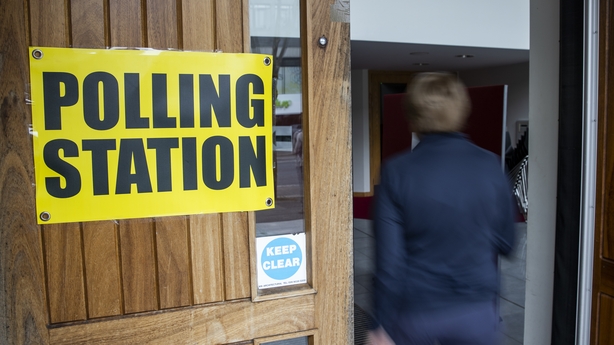
David McCann, a political journalist working for the Slugger O'Toole website, said that if the DUP can hold off the challenge from its hardline unionist rivals, the Traditional Unionist Voice, a resumption of power-sharing is more likely.
"If the TUV do well and take seats off the DUP, then that's going to make that much, much harder for [DUP leader] Jeffrey Donaldson to do.
"So the thing to look out for there is the internal unionist battle, how many seats can the TUV win off the DUP.
"If the DUP hold their ground and see off the TUV, which they have done before, then that will give Jeffrey Donaldson more confidence to go back into government."
Sinn Féin is running more candidates than in 2019 and hopes to overtake the DUP as the biggest party of local government.
The DUP was the largest party last time, with 122 councillors - 17 more than Sinn Féin.
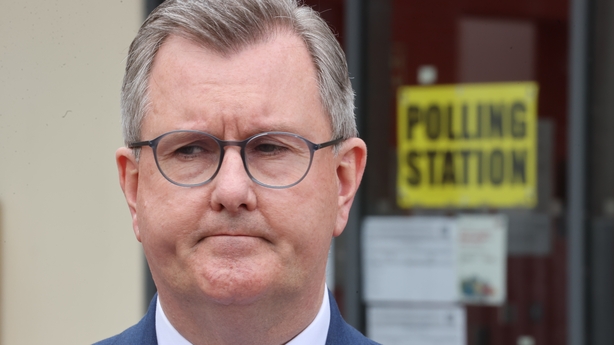
But the unionist party is running 20 fewer candidates this time, in the hope of protecting what it already holds.
Sinn Féin had 105 councillors elected in 2019 and will be hoping to pick up seats in places like Derry city and Strabane and Newry, Mourne and Down council.
"The momentum is definitely behind them, they are running more candidates, they are growing in confidence ... so Sinn Féin are very well placed to become the biggest party of local government, which would be a first in the history of Northern Ireland," Mr McCann said.
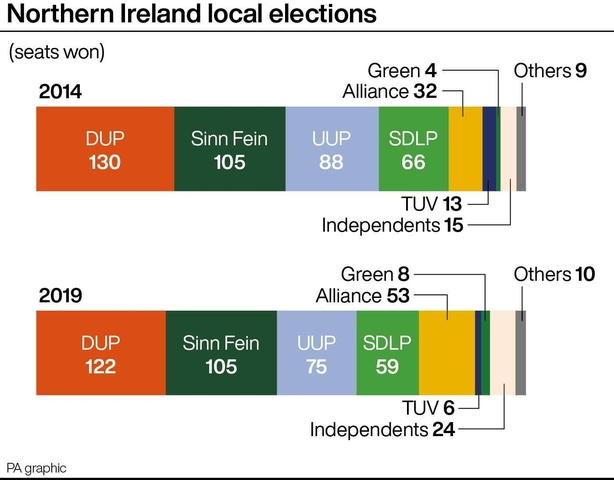
Michelle O'Neill has been to the forefront of its campaign, with the party reminding voters that she has been unable to take up the First Minister position at Stormont, due to the DUP's year-long boycott of the institutions.
That could cause problems for the SDLP if nationalists are persuaded to rally around that messaging.
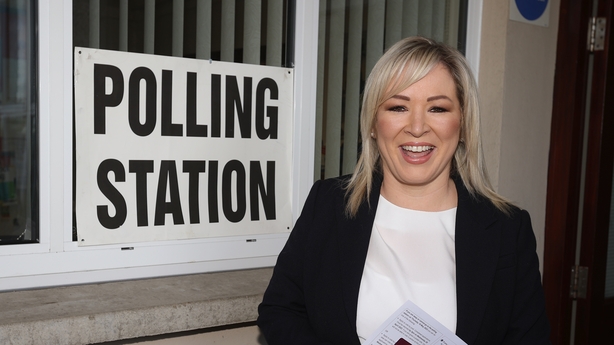
SDLP leader Colum Eastwood has already urged voters not to punish his party because of the DUP's stance.
Mr Eastwood's party has 59 councillors and will hope to restrict further shrinkage.
The Alliance Party made significant gains last time and hopes to build on that, particularly on councils in the west where it is not traditionally as well represented.
It was the fifth largest party last time and will be hoping to change that.
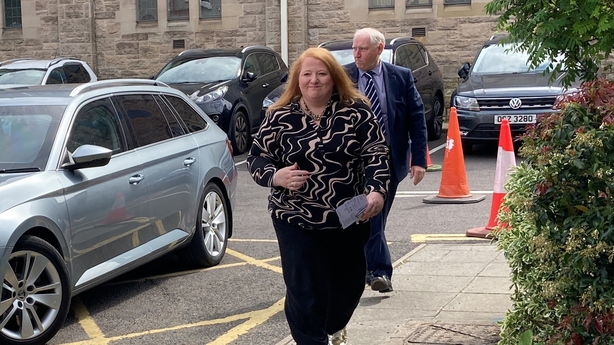
It is predicted that it could leapfrog both the Ulster Unionists and the SDLP to become the third biggest party of local government.
The Ulster Unionist Party could be under pressure if the unionist electorate decides to coalesce around the DUP to try to prevent Sinn Féin becoming the biggest party of local government.
The UUP was the third biggest party in 2019, with 75 seats after the DUP and Sinn Féin.
BBC NI union members to strike
Meanwhile, National Union of Journalists (NUJ) members working across BBC Northern Ireland will take part in 24-hour strike action tomorrow in opposition to proposed cuts to jobs and programmes.
An industrial action ballot of members delivered a result of 83% voting in favour of strike action, following what they call the "failure of BBC management to save valued programmes across Northern Ireland, and guarantee the security of journalists' jobs".
In a statement this afternoon, the NUJ said that its members believe the BBC’s restructuring plans will impact resources and their ability to deliver quality programmes across Northern Ireland.
"For example, last month the Radio Foyle Breakfast Show was dramatically altered, now 30 minutes instead of its original two-hour duration. Communities across Northern Ireland have expressed dismay and anger over the impact of cuts to services, urging the BBC to rethink plans."
The NUJ has been engaged in negotiations with the BBC and has urged them to return to discussions with viable options on alternative ways to make savings.
Strike action begins at 12.15am tomorrow and ends at 12.15am on Saturday.
NUJ assistant general secretary Seamus Dooley said the union recognised the impact of striking on a significant news day.
"We have been engaged in comprehensive negotiations, but we have not made sufficient progress to meet the expectations of our members," he said.
"The decision to strike on such a significant news day has not been taken lightly and reflects frustration on the part of NUJ members.
"They want to report the news rather than make their own headlines, it is regrettable that they find themselves in this situation.
"We assure viewers, listeners and readers that the priority of the NUJ is the maintenance of public service broadcasting and that commitment informs this dispute."







